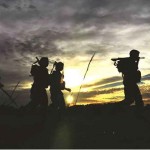In late 1980s, an Engineer Regiment was asked to move to high altitude area as part of normal turn over of units. The regiment put in its demand for high altitude clothing for the troops well in time. However, the case got mired in bureaucratic wrangles between the Command Headquarters and the Army Headquarters. The regiment had to move without the said clothing. Unfortunately, the area received early snowfall, the regiment got trapped en route and suffered heavy casualties – both fatal and frostbite. Subsequent enquiries revealed total apathy and indifference by the military officers involved in releasing snow clothing. They got embroiled in petty squabbles and showed no urgency or concern for the troops.
One of the commonest complaints heard from the troops is regarding the functioning of senior military officers posted at higher headquarters. It is a general refrain that they tend to be more bureaucratic than the career bureaucrats.
In another case, disagreement between the two senior military officers over the number of backup batteries required made expensive imported equipment lie unutilized, while the troops suffered. In yet another case, a senior commander ordered that every military person wanting to visit Hussainiwala must obtain a pass from the Divisional Headquarters located at Ferozepur at a distance of nearly 30 km. It served no purpose at all as no military man could possibly be denied permission. There was no need and justification for the said order. It caused immense difficulties to all visitors. It was a classic case of bureaucratic mindset. There are numerous such instances.
One of the commonest complaints heard from the troops is regarding the functioning of senior military officers posted at higher headquarters. It is a general refrain that they tend to be more bureaucratic than the career bureaucrats and become totally insensitive to ground realities. For them, procedures and rules take precedence over troops’ requirements, howsoever urgent they may be. According to general perception, commanders-turned-bureaucrats do more damage than good while occupying critical appointments at decision making level at higher headquarters.
Bureaucrats
On 21 April 2008, on Civil Services Day, the Indian Prime Minister exhorted the civil services to ‘break their stereotype image as non-performers’. “The most important challenge is to instill confidence in our people that our civil services are fair, honest, as well as efficient,” he added. Over the years, bureaucracy has come to be associated with inertia, status quo and apathy. This may not be a very fair description of their functioning but it does indicate a general loss of confidence in their competence to deliver.
Also read: Transformational Technologies for Navy of the Future
Emergence of bureaucracy can be attributed to societal need to have a sound and skilled organisation whose members possess specialised expertise and provide certainty, continuity and unity in a methodical, anonymous, impersonal and independent manner. German sociologist Max Weber (1864-1920) called bureaucracy as the most technically proficient form of organisation. A bureaucrat takes pride in being systematic and meticulous.
A fresh IAS appointee, if put in deep freeze and taken out after 15 years will be a Joint Secretary. Moreover, he will be regarded highly as he would have taken no decisions and rocked no boat.
However, over a period of time, rigid adherences to rules, regulations, systems and procedures gained ascendancy over every other trait. In a way, the whole functioning became captive of regulations, conventions and precedence. Every proposal came to be examined as per the precedence. Invariably the initiator had to quote previous instances to say how it was done the previous time. Overabundance of files provided long lasting memory to bureaucracy. It made the bureaucracy live in the past rather than be futuristic and progressive. Gradually, it became an uncongenial, faceless and soulless system without any welfare orientation.
Maintenance of status-quo and abhorrence for change have become common traits now. Every bureaucrat is wary of infusion of newer ideas and techniques, lest his own qualifications and competence may become irrelevant. He is fully aware of his inability to keep pace with progressive techniques of governance and hence tends to stall reforms. Every bureaucrat is highly sensitive to any threat to his authority. However, in order to safeguard his own career interests, he involves maximum number of functionaries in decision making. Invariably, all acts of commission and omission are attributed to ’systemic failure’ rather than apportioning blame. Bureaucracy thrives on organizational parochialism. Acceptance of own mistakes and fallibility is yet to acculturate the system.




